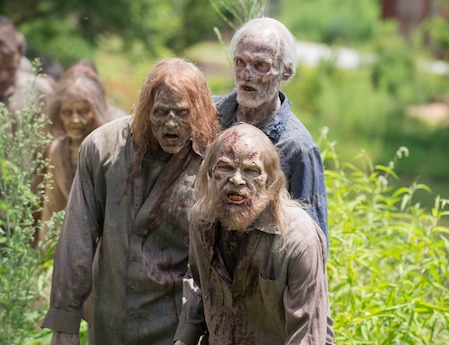‘Walking’ Away Empty-Handed

The smarter way to stay on top of broadcasting and cable industry. Sign up below
You are now subscribed
Your newsletter sign-up was successful
It’s awards season and all, and the mid-season premiere of The Walking Dead airs Sunday on AMC.
And so one can’t help but wonder—The Walking Dead gets the ratings of a broadcast hit from a decade ago, despite being on basic cable in this modern TV megaverse, yet it is unloved by many critics and those who give the awards.
Walking Dead received zero nominations in the 2015 primetime Emmys as well as at the Golden Globes last month. Same goes for the Critics Choice Awards, though The Walking Dead did win “Most Bingeworthy Series” last year. (I suppose that’s noteworthy, seeing as it was up against several series one can actually binge-watch.)
Rob Owen, respected critic for Scripps Howard News Service and the Pittsburgh Post-Gazette, disputes the idea that critics don’t appreciate The Walking Dead, pointing to its 80 Metascore across six seasons on Metacritic.com, out of 100. That’s well ahead of, say, critical darling Mozart in the Jungle (72), and nestled between buzzy rookies Mr. Robot (79) and Marvel's Jessica Jones (81).
Owen says bloody shows, outside of the top medical dramas, typically don’t get a lot of Emmy love. Same goes for genre series. “When it airs in the same year as Game of Thrones, also in a genre often overlooked, fantasy, then I think it's easier to see why the TV Academy can manage to make space for one outlier but maybe not two,” says Owen.
I screened the Walking Dead season finale at the ATV Festival in Atlanta last week; to see Rick and his fellow survivors drape themselves in zombie guts in an effort to blend in with the undead, on a big screen, well, you were thankful you didn’t have dinner plans after. The crowd at the SCAD Show theater gave the producers and a handful of cast members serious love, the show being an Atlanta creation and all.
“The show wouldn't be half of what it is [if it was shot] in Los Angeles,” said director Mike Satrazemis, to abundant applause.
The smarter way to stay on top of broadcasting and cable industry. Sign up below
I ran into Satrazemis after the panel, and asked him about Walking Dead’s lack of awards love. He shrugged. “I’m told it’s because it’s the horror genre, but to me it’s not horror,” he said, citing themes such as society and how humankind reacts to dire situations in the series.
Satrazemis did not seem to care a whit about the lack of Emmys and Golden Globes and Critics Choice awards. “We have everything we could want,” he said—commercial success, a cast and crew that likes working together, a fun job to go to, even if those Atlanta summers are warm.
The Walking Dead is, by any measure, a monster. The season finale in the fall did over 14 million live plus same day viewers. AMC has renewed Walking Dead for season seven and after-show Talking Dead too. Walking Dead airs on broadcast via MyNetworkTV, and cable net NBC Universo will air the Spanish language version this year. The show has of course spawned Fear the Walking Dead.
Walking Dead’s popularity may be working against it, says Dr. Deborah Jaramillo, assistant professor of film and TV studies at Boston University. “Critics aren't necessarily keen to align themselves with popular shows. Popular equals bad,” she says. “But a show like Rectify with maybe a handful of viewers—all masochists (myself included)—makes must-watch lists.”
Walking Dead’s comic book roots might also have something to do with its critical dismissal, Jaramillo believes. “Some people think it started strong and then outlived the strength of its premise,” she adds. “I know that the cliffhanger stunts in late 2015 drove some people nuts—that was really confusing to me because cliffhangers are the bread and butter of serialized TV.”
Anyway, a new season of Walking Dead starts Sunday. You love it or you don’t.
Millions and millions do.
Michael Malone is content director at B+C and Multichannel News. He joined B+C in 2005 and has covered network programming, including entertainment, news and sports on broadcast, cable and streaming; and local broadcast television, including writing the "Local News Close-Up" market profiles. He also hosted the podcasts "Busted Pilot" and "Series Business." His journalism has also appeared in The New York Times, The L.A. Times, The Boston Globe and New York magazine.

